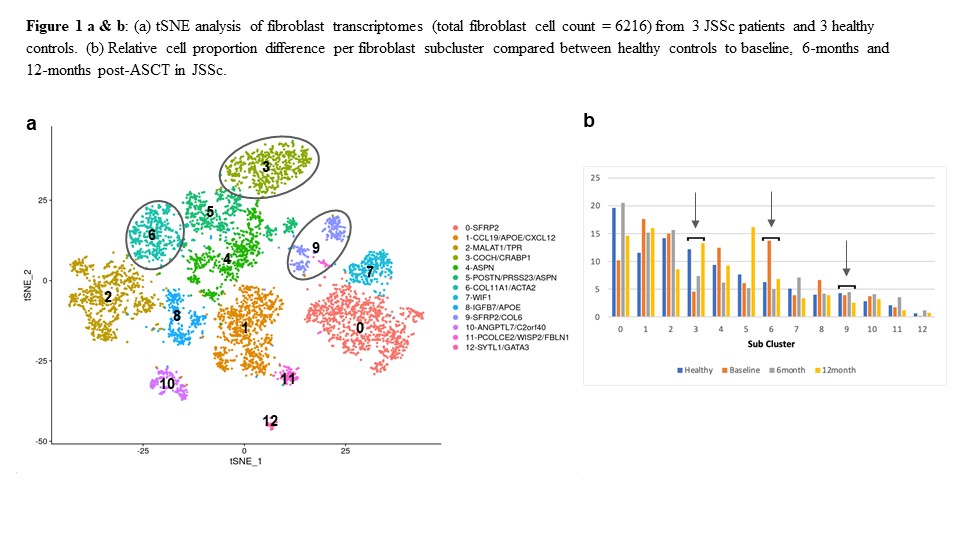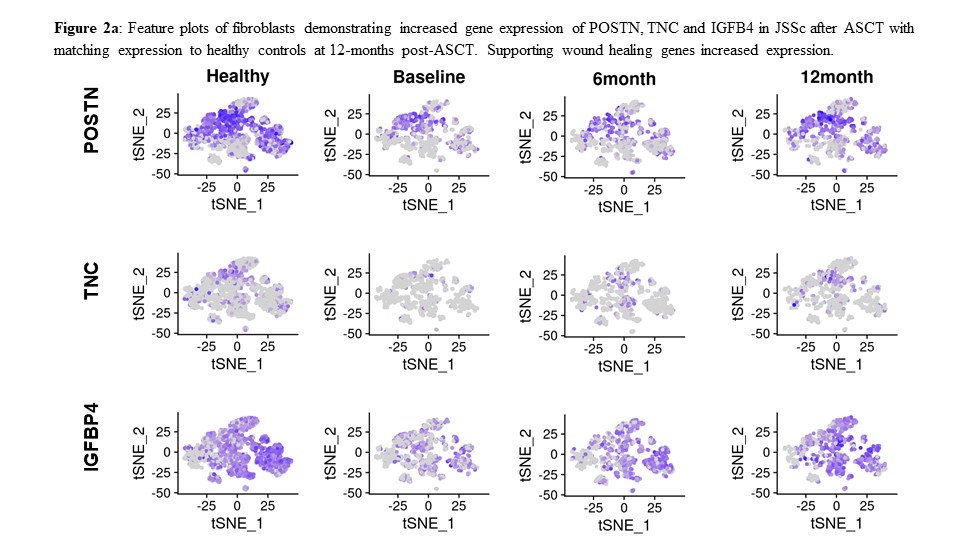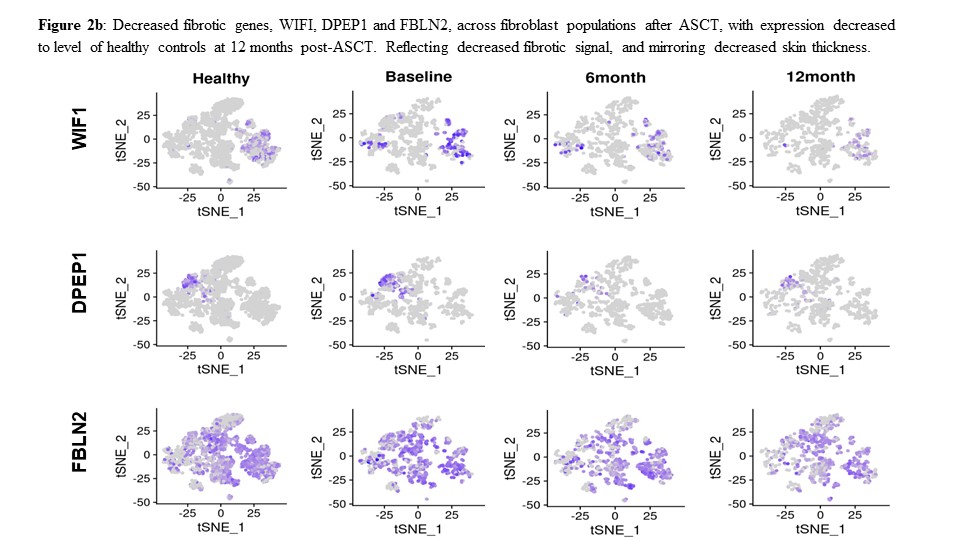Session Information
Date: Saturday, April 1, 2023
Session Type: Plenary Session
Session Time: 11:00AM-12:00PM
Background/Purpose: Juvenile systemic sclerosis (JSSc) is a rare autoimmune disease associated with high morbidity. Inflammatory driven multi-organ fibrosis is similar to adult-onset SSc, with 40% of JSSc patients recently identified in an international cohort to have interstitial lung disease. There are a group of JSSc patients that have severe, refractory disease to standard immunosuppression regimens. For these patients, autologous stem cell therapy (ASCT) provides a possibility to reset the immune system and provide clinical benefit with much lower transplant-related mortality. Our center reported the clinical improvement of the first 3 JSSc patients with a CD-34 selected ASCT protocol at the American College of Rheumatology 2021 Convergence (Abstract 0778). The current abstract describes the single-cell RNA sequencing (scRNA-seq) profile of these 3 JSSc patients skin at baseline (pre-ASCT), 6-mos and 12-mos post-ASCT to define the shift in fibroblast populations and transcriptome expression.
Methods: scRNA-seq was performed on the skin of 3 JSSc patients at the baseline, 6-mos and 12-mos post-ASCT, along with 3 healthy aged-matched controls. Library preparation with a 10X Genomics® Chromium instrument and sequencing on Illumina NextSeq instrument was performed. Transcripts were mapped to reference human genome GRCh38 and assigned to cells of origin using the Cell Ranger pipeline (10X Genomics®). R-language analyses using Seurat and Harmony identified and visualized distinct cell populations by clustering methodologies.
Results: JSSc and healthy control fibroblasts clustered into 13 unique subclusters (Fig 1a). One fibroblast subcluster, defined by COCH/CRABP1(3) expression, increased after ASCT and at 12-mos post-ASCT it matched the frequency found in healthy controls (Fig 1b). Two fibroblast subpopulations, defined by COL11A1/ACTA2 (6) and SFRP2/COL6 (9) expression, decreased by half after ASCT, both mirroring healthy control frequency by 12 mos post-ASCT. In addition to the shift of these fibroblast subclusters towards a healthy distribution after ASCT, differential expression of gene (DEG) analyses found significant changes in pro-fibrotic genes: WIF1, DPEP1, and FBLN2, with decreased expression after ASCT (Figure 2a), and changes in wound-healing genes: POSTN, TNC, and IGFBP4, with increased expression after ASCT (Figure 2b). All 3 patients experienced dramatic improvement in skin score and other global outcome measures by 6 mos and sustained this at 12 mos (data not shown here; ACR 2021 Abstract 0778).
Conclusion: Dynamic changes were noted in JSSc fibroblast subclusters, overall shifting toward a healthy skin fibroblast distribution by 12-mos post-ASCT. The COL11A1/ACTA2 cluster represents contractile follicle-related cells containing myofibroblasts, and the SFRP2/COL6 cluster represent reticular and papillary dermal cells, both decreasing after ASCT and possibly pathogenic, and will be further studied. DEG analysis showed an upregulation of wound-healing associated genes: POSTN, TNC, and a downregulation of fibrosis-related genes: WIF1, DPEP1, and FBLN2, reflecting shift in fibroblast phenotype toward decreased fibrosis and increased elasticity.
 Figure 1 a & b: (a) tSNE analysis of fibroblast transcriptomes (total fibroblast cell count = 6216) from 3 JSSc patients and 3 healthy controls. (b) Relative cell proportion difference per fibroblast subcluster compared between healthy controls to baseline, 6-months and 12-months post-ASCT in JSSc.
Figure 1 a & b: (a) tSNE analysis of fibroblast transcriptomes (total fibroblast cell count = 6216) from 3 JSSc patients and 3 healthy controls. (b) Relative cell proportion difference per fibroblast subcluster compared between healthy controls to baseline, 6-months and 12-months post-ASCT in JSSc.
 Figure 2a: Feature plots of fibroblasts demonstrating increased gene expression of POSTN, TNC and IGFB4 in JSSc after ASCT with matching expression to healthy controls at 12-months post-ASCT. Supporting wound healing genes increased expression.
Figure 2a: Feature plots of fibroblasts demonstrating increased gene expression of POSTN, TNC and IGFB4 in JSSc after ASCT with matching expression to healthy controls at 12-months post-ASCT. Supporting wound healing genes increased expression.
 Figure 2b: Decreased fibrotic genes, WIFI, DPEP1 and FBLN2, across fibroblast populations after ASCT, with expression decreased to level of healthy controls at 12 months post-ASCT. Reflecting decreased fibrotic signal, and mirroring decreased skin thickness.
Figure 2b: Decreased fibrotic genes, WIFI, DPEP1 and FBLN2, across fibroblast populations after ASCT, with expression decreased to level of healthy controls at 12 months post-ASCT. Reflecting decreased fibrotic signal, and mirroring decreased skin thickness.
To cite this abstract in AMA style:
Cheng C, Werner G, Sanyal A, Torok K. Single Cell RNA Sequencing Analysis of the Skin to Evaluate the Effect of Autologous Stem Cell Transplant on Fibroblast Populations in Juvenile Onset Systemic Sclerosis [abstract]. Arthritis Rheumatol. 2023; 75 (suppl 4). https://acrabstracts.org/abstract/single-cell-rna-sequencing-analysis-of-the-skin-to-evaluate-the-effect-of-autologous-stem-cell-transplant-on-fibroblast-populations-in-juvenile-onset-systemic-sclerosis/. Accessed .« Back to 2023 Pediatric Rheumatology Symposium
ACR Meeting Abstracts - https://acrabstracts.org/abstract/single-cell-rna-sequencing-analysis-of-the-skin-to-evaluate-the-effect-of-autologous-stem-cell-transplant-on-fibroblast-populations-in-juvenile-onset-systemic-sclerosis/
